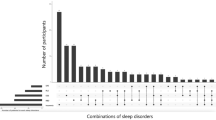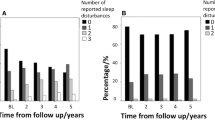Summary
The objective of this questionnaire-based survey was to evaluate the prevalence and causes of sleep disturbances in 90 nondepressive patients with Parkinson's disease (PD) and 71 age-matched healthy subjects. We also assessed the prevalence and characteristics of excessive daytime sleepiness (both groups) and excessive fatigue (PD patients).
A high prevalence of sleep disturbances in PD patients was found; this is to a large extent probably the result of aging. As compared with controls, patients had a more severely disturbed sleep maintenance because of nycturia, pain, stiffness, and problems with turning in bed. The prevalence of excessive dreaming is similar in both groups, but altered dream experiences almost exclusively occurred in PD.
Patients rated themselves more often to be morning-types than controls. This finding may account for the reported adaptation effects in experimental settings and the reduced REM latency in PD patients.
The prevalence of daytime sleepiness was similar in both groups. Excessive daytime sleepiness showed a clear diurnal pattern with a peak in the early afternoon. As for excessive fatigue, the majority of the patients did not report a preferential time for this symptom. Our findings further argue against an association of fatigue with any circadian factor, and instead suggest a relationship with the motor deficits of PD.
Similar content being viewed by others
References
Askenasy JJM, Yahr MD (1985) Reversal of sleep disturbance in Parkinson's disease by anti-parkinsonian therapy: a preliminary study. Neurology 35: 527–532
Berger Y, Blaivas JG, DeLaRocha E, Salinas JM (1987) Urodynamic findings in Parkinson's disease. J Urol 138: 836–838
Carskadon MA (1989) Sleep and alertness, 1st ed. Raven Press, New York, pp 53–69
Critchley PHS, Malcom GP, Malcom PN, Gibb WR, Arend R, Parkes JD (1991) Fatigue and melatonin in Parkinson's disease. J Neurol Neurosurg Psychiatry 54: 91–92
Factor SA, McAlarny T, Sanchez-Ramos JR, Weiner WJ (1990) Sleep disorders and sleep effect in Parkinson's disease. Mov Disord 5: 280–285
Fahn S, Elton RL (1987) Recent developments in Parkinson's disease. MacMillan Healthcare Information 2, New Jersey, pp 153–163
Folstein M, Folstein S, McHugh PJ (1975) “Mini mental State”: a practical method for grading the cognitive state of patients for the clinician. J Psychiatr Res 12: 189–198
Giles DE, Jarrett RB, Roffwarg H, Rush AJ (1987) Reduced rapid eye movement latency. Neuropharmacology 1: 33–39
Hoehn MM, Yahr MD (1967) Parkinsonism: onset, progression and mortality. Neurology 17: 427–442
Ishihara K, Miyasita A, Inugami M, Fukuda K, Miyata Y (1987) Differences in sleepwake habits and EEG asleep variables between active morning and evening subjects. Sleep 10: 330–342
Kales A, Ansel RD, Markham CH, Scherf MB, Tan TL (1971) Sleep in patients with Parkinson's disease and normal subjects prior to and following levodopa administration. Clin Pharmacol Ther 12: 397–406
Kerkhof GA (1991) Differences between morning-types and evening-types in the dynamics of EEG slow wave activity during sleep. Electroencephalogr Clin Neurophysiol 78: 197–202
Kostić VS, Šušic V, Čovičkovic-Šternić N, Marinkvić Z, Jancović S (1989) Reduced rapid eye movement sleep latency in patients with Parkinson's disease. J Neurol 236: 421–423
Krupp LB, Larocca NG, Muir-Nash J, Steinberg AD (1989) The fatigue severity scale. Arch Neurol 46: 1121–1123
Lees AJ, Blackburn NA, Campbell VL (1988) The highttime problems of Parkinson's disease. Clin Neuropharmacol 6: 512–519
Marsden CD, Parkes JD (1981) Research progress in Parkinson's disease. Pitman Medical, London, pp 265–274 (Progress in neurological series, vol 117)
Moran MG, Thompson TL, Nies AS (1988) Sleep disorders in the elderly. Am J Psychiatry 145: 1369–1378
Morewitz JH (1988) Evaluation of excessive daytime sleepiness in the elderly. J Am Geriatr Soc 36: 324–330
Nausida PA, Weiner WJ, Kaplan LR, Weber S, Klawans HL (1982) Sleep disruption in the course of chronic levodopa therapy: an early feature of the levodopa psychosis. Clin Neuropharmacol 5: 183–194
Schwab RS, England AC, Peterson E (1959) Akinesia in Parkinson's disease. Neurology 9: 65–72
Sharf B, Moskovitz Ch, Lupton MD, Klawans HL (1978) Dream phenomena induced by chronic levodopa therapy. J Neural Transm 43: 143–151
Tinetti ME (1986) Performance-oriented assessment of mobility problems in elderly patients. J Am Geriatr Soc: 34: 119–126
Author information
Authors and Affiliations
Rights and permissions
About this article
Cite this article
van Hilten, J.J., Weggeman, M., van der Velde, E.A. et al. Sleep, excessive daytime sleepiness and fatigue in Parkinson's disease. J Neural Transm Gen Sect 5, 235–244 (1993). https://doi.org/10.1007/BF02257678
Received:
Accepted:
Issue Date:
DOI: https://doi.org/10.1007/BF02257678




